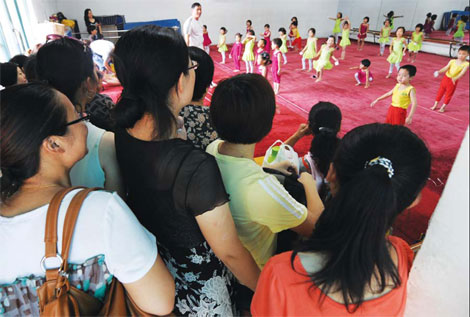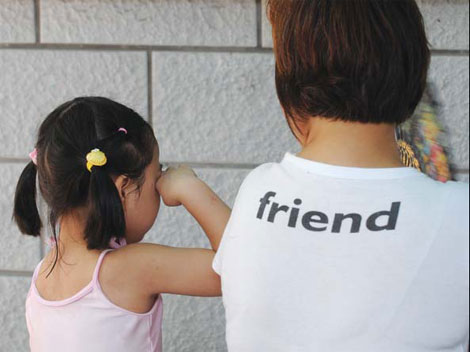China Face
The parent trap
Updated: 2011-01-28 11:06
By Tang Yue (China Daily European Weekly)
 |
|
Chinese parents suffer from the anxiety of wanting the best education for their |
Experts say there is need to moderate demands on children
Hou Yifan seems to be the classic example of how things turn out well when parents and institutions work closely together to improve a child's potential. But what about the rest of anxious parents who have been confused by child-raising philosophies ranging from Dr Spock to Amy Chua?
Many generations of Chinese parents were raised in the Confucian mold, where the parental word was final and unquestionable.
Children were taught to obey and do their best to repay their parents' blood-and sweat-stained efforts.
But even China's own experts are beginning to moderate their leanings.
 |
|
Sometimes a child succumbs to the pressures and needs a friend, and the |
Xiong Bingqi, the deputy director of the 21st Century Education Research Institute, says there are three factors dictating the pressures of parenthood these days.
The first is the incumbent examination system, with its tiers of meritocratic filtering, which starts from primary school to pre-college. These exams focus on individual achievement, which prompts parents to send their children for extra-curriculum lessons purely to gain brownie points in the promotion ladder.
Inadequate resources create a situation where demand far exceeds supply in the case of proven institutions of quality. Parents push their children into the top percentages of scholars because they want them enrolled in good schools.
The residential registration system also plays a part in the push-and-pull. The disparity of income in various jobs is another factor. Good scholarship and academic qualification may be the only things standing between a student and the China Dream his parents want for him.
There is no comparison between the education system of China, and the West, simply because a different set of motivation drives the Chinese, most of whom suffer a group anxiety of wanting the best for their children, and this anxiety drives them to push harder, sometimes to the detriment of the child.
Xiong also believes things have changed enough in China that family education has become an extension of what's being taught in the schools, instead of what it used to be - a place where the child gets not an academic education but lessons on life and living.
In the end, the child's success is not measured only in report cards, it has to be judged on his ability to live happily as a well-balanced human being.
Sun Yunxiao, deputy director of the China Youth Education Research Center, feels that growth and education must follow a studied progress, and no extreme method can be good for the child.
The child cannot be indulged, but he cannot be dictated to, either.
Like Xiong, Sun feels the current emphasis on academic excellence neglects the "real" education for the physical, mental and emotional needs of the child as well as character building.
He warns that a child started too early on a fast-track, hot-housing system may suffer emotional damage.
Xiong explains why Western parents may be intrigued by Amy Chua's theories. Their way isn't working either, and they are looking for alternatives.
Specials

President Hu visits the US
President Hu Jintao is on a state visit to the US from Jan 18 to 21.

Ancient life
The discovery of the fossile of a female pterosaur nicknamed as Mrs T and her un-laid egg are shedding new light on ancient mysteries.

Economic Figures
China's GDP growth jumped 10.3 percent year-on-year in 2010, boosted by a faster-than-expected 9.8 percent expansion in the fourth quarter.